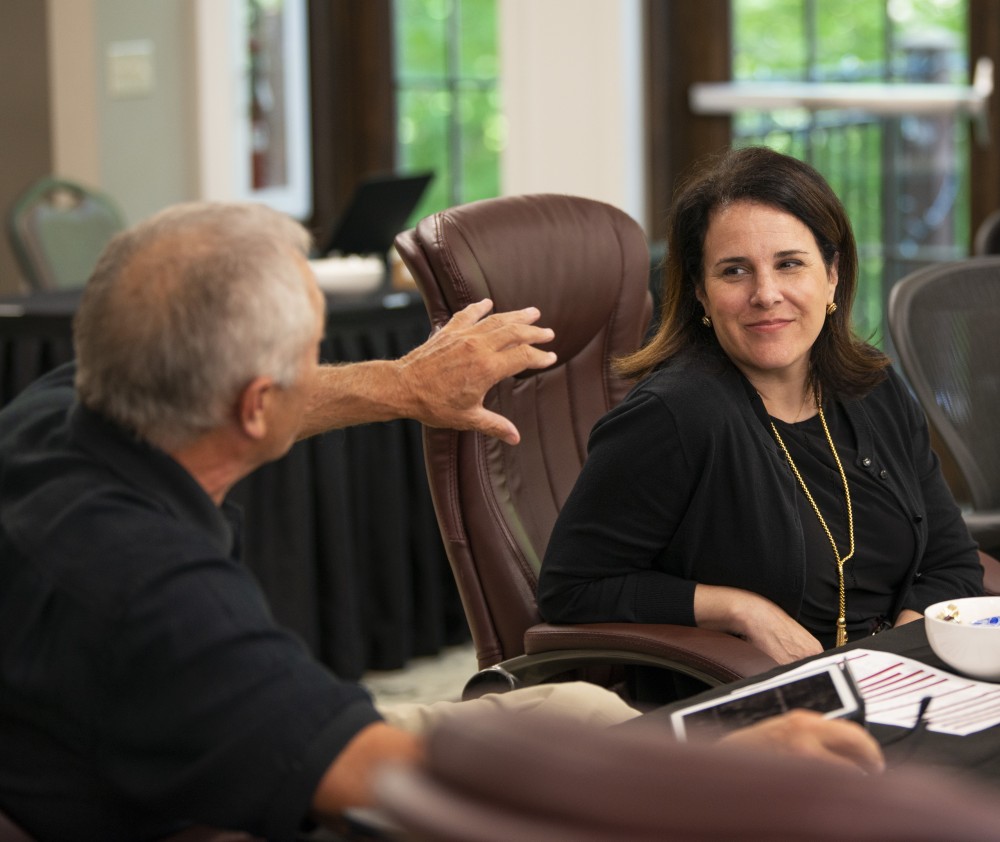At the regents retreat earlier this month, members of the Board of Regents and President Joan Gabel discussed the University of Minnesota’s research goals as a pillar that will ultimately go into the next system-wide strategic plan.
Gabel kicked off the research roundtable with a basic question: “What kind of research powerhouse do we want to be?”
Schools of thought vary when chasing down research dollars, Gabel said. The philosophy could be pursuing funding en masse, or it could be incentivizing faculty research catering to fields uniquely relevant for the University and the state. She emphasized that there could be trade-offs to either position, and prioritizing locally focused research could lead to less total grant money.
“This is arguably one of our most opportunistic places to leverage distinction and to create signatures around who we are as compared to anyone down the street from us,” Gabel said at the meeting.
The University ranked ninth among U.S. public research institutions in the 2017 fiscal year, third in the Big Ten behind Michigan and Wisconsin, according to a National Science Foundation survey of total research expenditures.
“Do we want to go to number nine to number five?” Gabel asked. “We can do that; that could be a goal.”
But while the overall rankings are strong, some regents expressed an interest to rank higher in areas of research specific to the state.
Surrounded by a burgeoning medical device industry, regents questioned if the University should be number one in medical technology research. In a state that boasts a vast number of lakes on its license plate, they pondered if the University should be the “water guys.”
While total research dollars is a straightforward metric to compare the University with other schools nationally, narrowing down rankings for various domains of research is not as simple.The University stacks up somewhere between 51 and 75 worldwide for both medical technology and water resources research, according to Shanghai Ranking’s Global Ranking of Academic Subjects 2019.
When it came to listing potential goals, regents expressed a desire to better align research with the land-grant mission of the institution. The line of what is Minnesota-centered research and what is not can be tricky to pin down. While research may have a local tinge, it often has implications spanning far outside the upper Midwest.
Diana Karwan, assistant professor in the College of Food, Agricultural and Natural Resource Sciences who researches forest hydrology and watershed management, said the impact of her research stretches far beyond the state border.
“Just looking at northern Minnesota, not even statewide, the water that is there flows different places. It flows across state boundaries and it flows across national boundaries,” Karwan said. “So there are some areas of research that can be hard to isolate in political boundaries.”
Many regents shared the goal of bolstering medical research, and several expressed a desire to make the Medical School among the top 10 in the country.
“Top-ranked medical schools attract and preserve the best and brightest students, doctors and researchers,” Dr. Ali Salavati, a researcher in the Medical School’s radiology department working to improve the accuracy of detection of recurrent prostate cancer, said in an email. “These talented individuals will bring innovations, high quality health care, reputation and funding to the University.”
Citing Minnesota as a hub for medical technology companies, Regent Michael Hsu said the University should be number one for med tech research. At the retreat, Hsu said he has talked with people at local companies that bypass the University to go to other schools for their research. He questioned if the University needs to find better researchers.
Oral cancer researcher Dr. Nelson Rhodus said a strong foundation for research is about more than just the academic researchers. Rhodus, a professor in both the Dentistry and Medical Schools, said it is about the entire system where the research is conducted.
“If I have to do everything by myself … simply because I don’t have the support, then obviously I am not going to be that productive,” Rhodus said. “When you develop facilities, infrastructure, support systems, it just maximizes your team who has the expertise to do what they do.”








